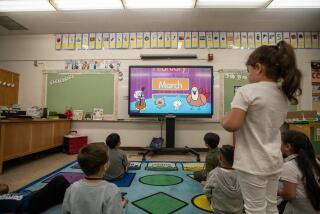BREA : Mentor Helps Put New Teachers at Ease
- Share via
Like everyone else in her first-grade class, Theresa Stull was excited during her first day of school. If she was more nervous than most, there was a reason--she was the teacher.
“I don’t even remember most of it now. It was a neat feeling, like starting something new,” Stull said.
A month after she met her students for the first time at Arovista Elementary School, the 26-year-old Stull, one of 18 new teachers in the Brea-Olinda Unified School District, said her nerves are calmer.
She is not terrified of going into a classroom full of 6-year-olds, thanks in part to a mentor-teacher, who devised a unique welcome-aboard gift he creatively labeled “New Teacher Survival Kit.”
Mark Kercheville, who is in his 20th year of teaching and is a mentor-teacher for the first time this year, made the kit for laughs, but for Stull, at least, it has come in handy.
Her favorite item from the kit? The whistle.
“My class was wild today. This helped,” Stull said, pointing to the whistle dangling from her key chain.
Presented to all new teachers of the district during a recent board meeting, the kits contained a chalk holder, pencils, markers, a stick-on note pad, a weekly reminder pad and happy-face stickers.
Among the favorite items were mint candies and pain relief tablets.
“It was for laughs,” district Supt. Edgar Z. Seal said about the kit. “It was also for people to understand that teaching is a serious job, (and) sometimes you get a headache, you feel bad.”
Seal said Kercheville was selected mentor for new teachers because of his expertise and experience in the elementary curriculum.
“He is probably one of the finest teachers in our school system,” Seal said.
Kercheville, a sixth-grade teacher for the past nine years after teaching fourth grade for 11 years, said new teachers need a lot of support.
“Teachers, especially new ones, sometimes feel overwhelmed,” he said. Managing the classroom in the face of society’s high expectations and increasingly limited resources is tough, he said.
Many children of dysfunctional families bring a lot of “baggage” into the classroom, Kercheville said. Some are victims of abuse or neglect. “In dealing with the problems of certain students, the teacher is often a psychologist and a counselor,” he said.
Some problems are of a practical nature, like a lack of supplies.
“We beg, borrow or steal,” to accumulate enough materials, Kercheville said. For new teachers, this problem is second only to managing the classroom, he said.
Mentors receive a $4,000 stipend under a federal program to encourage professional growth among teachers, Seal said. In addition, the mentors receive $1,300, which can be used to purchase school supplies.
Kercheville said he intends to use part of the money for substitute teachers so the new teachers can attend in-service seminars or observe experienced teachers at work.
“New teachers need a lot of observing classrooms,” he said. “We must foster a nurturing environment where it’s allowed to make some mistakes, to take some risks.”
Kercheville, 41, a father of three, said he takes pride in the fact he is teaching in the same school he went to as a child. “The principal who knew me as a child hired me as a teacher,” he said.
Kercheville went to Western Kentucky University in Bowling Green for his bachelor’s degree in education. He started teaching at Arovista right after graduating in 1973. He earned his master’s from Cal Poly Pomona in 1980.
More to Read
Sign up for Essential California
The most important California stories and recommendations in your inbox every morning.
You may occasionally receive promotional content from the Los Angeles Times.










